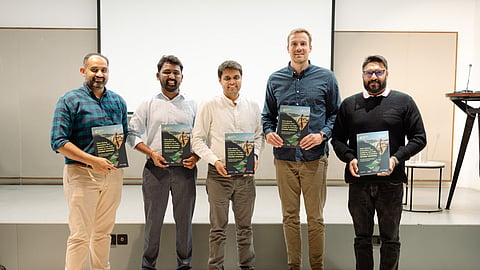

BENGALURU: “Despite the vibrancy of Bengaluru’s startup ecosystem, upstream circularity, innovations that prevent waste before it’s created, remains largely untapped”, said Bjarke Kovshøj, Strategic Programmes Manager, Climate KIC--Europe's leading climate innovation agency and community.
He spoke after releasing a new report by Climate KIC titled “How Strong Innovation Ecosystems Can Create Inclusive Circular Economies,” here on May 22. The report draws in-depth insights from Circular Economy Innovation Clusters (a joint initiative by Climate KIC, GrowthAfrica, and SecondMuse, funded by the IKEA Foundation) operating in Bengaluru and Nairobi.
“Like many Indian metropolises, Bengaluru is grappling with an accelerating waste crisis—landfills nearing capacity, growing pressure on informal waste workers, and increasing threats to health and the environment that is compounded by the shifting climate changes. Yet the report reframes this challenge as a generational opportunity: to build a city where waste is no longer a problem to manage, but a resource to design out of the system altogether”, he said.
“This report demonstrates how localised, inclusive innovation clusters can unlock scalable solutions that don’t just manage waste but prevent it”, he added.
The study emphasises the critical role of informal waste workers in the city’s ecosystem, calling for a transition that includes upskilling, better working conditions, and integration into new business models. Ventures supported by the CEIC programme in Bengaluru have already impacted over 130 informal workers and contributed towards a combined carbon dioxide reduction potential of more than 21,000 tonnes annually.
“Circularity isn’t just about reducing waste—it’s about redesigning the system itself. This report reminds us that real innovation emerges when we centre local communities, rethink the value of waste, and invest in models that prevent waste from being created in the first place”, Bjarke Kovshøj said.
The report positions Bengaluru as a potential model for the rest of the country, showing how strong local innovation ecosystems can be a vehicle for climate action, economic inclusion, and urban sustainability. The learnings from Bengaluru are already generating interest from other Indian cities looking for tested, practical approaches to build circular systems.
The Circular Economy Innovation Cluster’s (CEIC’s) work is aligned with broader national priorities, including Swachh Bharat, Smart Cities, and the Government of India’s circular economy mission. It offers a roadmap for how cities can combine innovation, inclusivity, and local leadership to build a cleaner, more sustainable urban future.